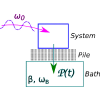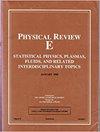周期性驱动两级系统的热容量
IF 2.4
3区 物理与天体物理
Q1 Mathematics
引用次数: 0
摘要
我们定义了稳定周期驱动系统的热容量,并以能量间隙受时间调节的耗散两级系统为例进行了计算。在这里,作为环境温度的函数,肖特基峰仍然是主要特征。然而,与平衡状态不同的是,非平衡系统的准静态热反应也揭示了存在于转变速率中的动力学信息;例如,热容量取决于时间对称的反应活性,并随着动力学势垒的存在而变化。虽然在绝对零度时,热容量仍会消失,这与扩展的奈氏热公设一致,但消失的速度与平衡时不同。更广泛地说,我们讨论了对驱动频率和振幅的依赖。本文章由计算机程序翻译,如有差异,请以英文原文为准。

Heat capacity of periodically driven two-level systems
We define the heat capacity for steady periodically driven systems and as an example we compute it for dissipative two-level systems where the energy gap is time-modulated. There, as a function of ambient temperature, the Schottky peak remains the dominant feature. Yet, in contrast with equilibrium, the quasistatic thermal response of a nonequilibrium system also reveals kinetic information present in the transition rates; e.g., the heat capacity depends on the time-symmetric reactivities and changes by the presence of a kinetic barrier. It still vanishes though at absolute zero, in accord with an extended Nernst heat postulate, but at a different rate from the equilibrium case. More generally, we discuss the dependence on driving frequency and amplitude.
求助全文
通过发布文献求助,成功后即可免费获取论文全文。
去求助
来源期刊

Physical review. E
物理-物理:流体与等离子体
CiteScore
4.60
自引率
16.70%
发文量
0
审稿时长
3.3 months
期刊介绍:
Physical Review E (PRE), broad and interdisciplinary in scope, focuses on collective phenomena of many-body systems, with statistical physics and nonlinear dynamics as the central themes of the journal. Physical Review E publishes recent developments in biological and soft matter physics including granular materials, colloids, complex fluids, liquid crystals, and polymers. The journal covers fluid dynamics and plasma physics and includes sections on computational and interdisciplinary physics, for example, complex networks.
 求助内容:
求助内容: 应助结果提醒方式:
应助结果提醒方式:


